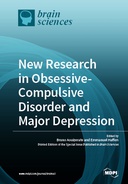Explore

New Research in Obsessive-Compulsive Disorder and Major Depression
Bruno Aouizerate and Emmanuel Haffen
2019
0 Ungluers have
Faved this Work
Login to Fave
Major depression and obsessive–compulsive disorder (OCD) are now recognized among the most frequent psychiatric disorders, affecting 16–17% and 2–3% of the general population, respectively. They are commonly characterized by: i) a high level of psychiatric and somatic comorbidities; ii) a recurrence or chronic profile; and iii) a negative impact on daily functions, thereby leading to a profound impairment of quality of life. Despite significant advances in pharmacological and psychological therapies over the last decades, unsuccessful responses to standard treatment strategies are classically observed in approximately 20–30% of cases. Therefore, there is a significant need for improving the pathophysiological knowledge through a better identification of environmental, clinical, psychological, genetic, anatomical, and biological determinants, specifically implied in the development, the phenotypic expression, and the relapsing course and/or contributing to the therapeutic failure in major depression and OCD. We are convinced that this research approach is particularly relevant providing critical support for the promotion of innovative treatment alternatives potentially useful for the management of resistant forms of major depression and OCD.
This book is included in DOAB.
Why read this book? Have your say.
You must be logged in to comment.
Rights Information
Are you the author or publisher of this work? If so, you can claim it as yours by registering as an Unglue.it rights holder.Downloads
This work has been downloaded 323 times via unglue.it ebook links.
- 192 - pdf (CC BY-NC-ND) at Unglue.it.
Keywords
- Brain stimulation
- categorizations
- Cognition
- compulsion
- Cytokines
- Depression
- ecological momentary assessment
- ecological momentary intervention
- fictional case study
- i-health
- immunology
- m-health
- markers
- n/a
- Neuromodulation
- nosography
- obsession
- obsessive–compulsive disorder
- OCD
- Olfaction
- pediatric acute-onset neuropsychiatric syndrome (PANS)
- pediatric autoimmune neuropsychological disorders associated with streptococcal infection (PANDAS)
- Psychiatry
- Quality of life
- Streptococcus pyogenes
- symptoms networks
- tDCS
- therapeutic tool
- Tourette syndrome
- Toxoplasma gondii
- transcranial direct current stimulation
Links
DOI: 10.3390/books978-3-03921-091-6Editions


